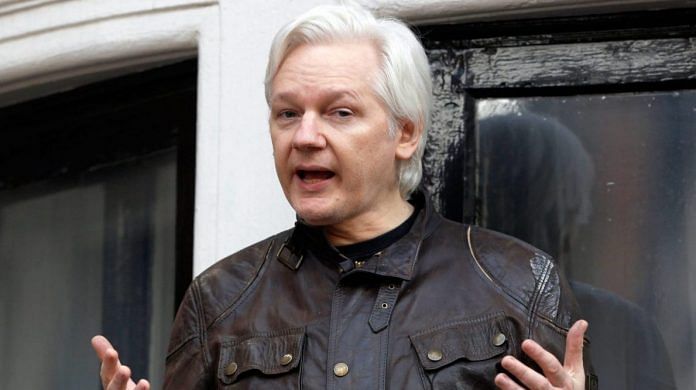Julian Assange was marched out of the Ecuadorian embassy in London on Thursday looking, in videos of his arrest, like a cranky, beleaguered version of Santa Claus. Or, depending on your perspective, a tired, down-on-his-luck burglar from a Dickens novel.
He may be both, in his mind, or just one or the other in the minds of his admirers and detractors. What will matter in court is whether the WikiLeaks founder committed a crime. And that should matter as well in the debate about whether he’s a journalist and publisher — and was therefore acting in a way that the U.S. Constitution and the First Amendment should protect (a salient issue if the U.S. government successfully extradites him from the U.K. to face charges).
A legal battle over Assange’s extradition to the U.S. could last months or years, but the debate over whether he’s a journalist should be settled much sooner.
In an indictment that federal prosecutors unsealed shortly after Assange’s arrest, the U.S. government accused Assange of assisting a former Army analyst, Chelsea Manning, to illegally hack “a password stored on United States Department of Defense computers.” WikiLeaks, a global, online network that distributes news leaks, classified information and other secret documents, published the Manning material starting in 2010.
To jog your memory: The Manning hack produced video footage of U.S. military personnel in a helicopter fatally shooting 18 people on the ground in Iraq; about 250,000 chatty and sensitive diplomatic cables sent to the State Department; unvarnished and dire U.S. military logs from the Iraq and Afghanistan wars; and secret documents relating to the U.S. government’s infamous Guantanamo Bay detention camp. All of these documents enriched the public’s understanding of two complex, tragic wars and opened a window into the federal government’s battle against terrorism — and some of its outrageous, gut-wrenching and legally questionable aspects — in the wake of the Sept. 11 attacks.
As a journalist and a citizen, I’m glad the information became part of a public discussion. To the extent that Assange and WikiLeaks only received and distributed information that Manning stole from government computers, I think that’s all fine and good. To the extent that Assange and WikiLeaks coached or assisted Manning in the theft, I think that’s bad. They took part in a crime and stopped being journalists. I may get in trouble in some quarters for saying this, but journalists stop being journalists when they help case the joint.
WikiLeaks cited Assange’s attorney in a Twitter post describing Assange’s arrest as “an unprecedented effort by the United States seeking to extradite a foreign journalist to face criminal charges for publishing truthful information.” But that statement doesn’t address whether Assange lent a hand to Manning in the Defense Department hack. Assange, his lawyer and WikiLeaks will all have to tackle that problem and not just shelter themselves inside the cloak of journalism and the truth.
Opinions about Assange and WikiLeaks are shaded, of course, by who you’re cheering for around certain events. Huzzahs for the Manning leaks gave way to disgust among some Assange-WikiLeaks fans for WikiLeaks’ role in publishing emails that Russian hackers stole from Democratic National Committee servers during the 2016 U.S. presidential election.
Some of this may become a slippery slope, I know. If journalism organizations publish contact information for secure drop boxes used to receive classified or private information, could that be considered encouraging a crime even if it’s not aiding and abetting? I think not, but any rulings around Assange could be interpreted in ways that make the government or any others opposed to a free press more aggressive about squelching journalism that’s in the public interest.
Assange himself is an imperfect, uninspiring messenger, but messengers are often imperfect. He can certainly lay claim to being a conscientious objector, engaging in a long and honorable tradition of civil disobedience. He may even have acted at times as only a publisher, disseminating information from others. If he became a hacker and broke the law, though, he was no longer a journalist and no longer just a messenger. He was a criminal.
Also read: Sexual assault & 7 years in asylum — the saga of WikiLeaks founder Julian Assange



